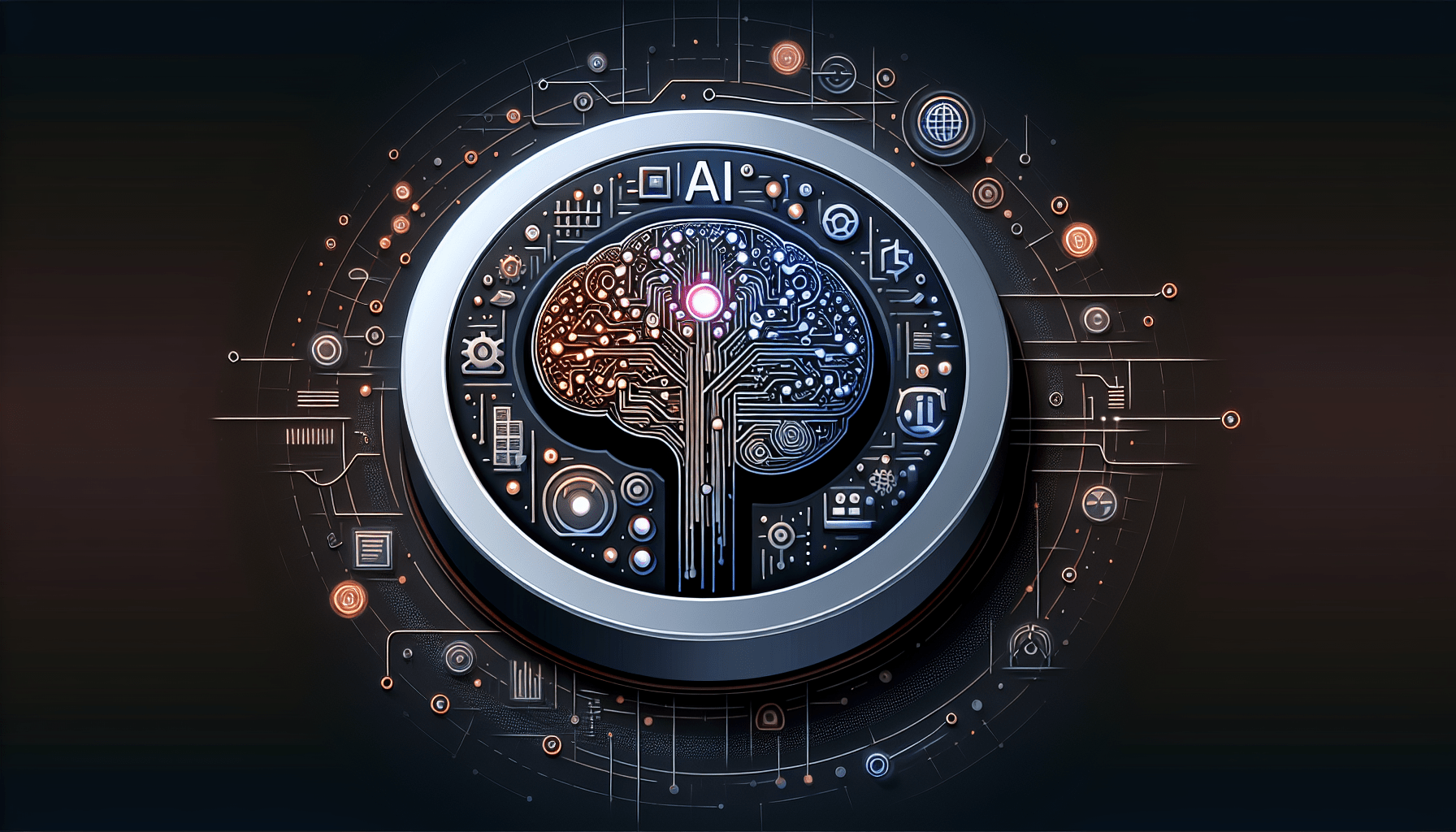Are you ready to dive into the world of Artificial Intelligence, but feeling a bit overwhelmed by the complexity of it all? Look no further! In this article, we will introduce you to the concept of Simplified AI Learning for Novices. If you’ve ever wondered how to learn AI the easy way, then this is the perfect guide for you. We will break down the intricate technicalities of AI into simple, easily understandable concepts, allowing even the most inexperienced individuals to grasp the foundations of this exciting field. Get ready for a journey of learning, understanding, and unleashing your AI potential!
Understanding AI
Artificial Intelligence (AI) is a branch of computer science that focuses on creating systems that can perform tasks that usually require human intelligence. These tasks can vary from speech recognition and image processing to decision-making and problem-solving. AI systems are designed to learn, reason, and adapt, making them capable of mimicking human behavior to some extent. AI can be classified into various categories based on their capabilities, such as narrow AI, general AI, and superintelligent AI.
What is AI?
AI is a field of study and development that aims to create intelligent systems that can perform tasks that would typically require human intelligence. These tasks include understanding and interpreting natural language, recognizing patterns in data, making predictions, and even engaging in logical reasoning. AI can be broadly divided into two types: narrow AI and general AI. Narrow AI is designed to excel at a specific task, while general AI is capable of performing any intellectual task that a human can do.

Why is AI important?
AI has become increasingly important in various industries due to its potential to automate tasks, improve efficiency, and enhance decision-making processes. By harnessing AI technologies, businesses can optimize operations, reduce costs, and deliver enhanced products and services to customers. AI has the potential to transform industries such as healthcare, finance, transportation, and manufacturing. It has the power to revolutionize the way we live and work, making it a crucial area of study and development.
Types of AI
AI can be categorized into several types based on their level of intelligence and functionality. Narrow AI, also known as weak AI, refers to systems that are designed to perform specific tasks, such as voice assistants, recommendation algorithms, and chatbots. General AI, on the other hand, refers to systems that possess the ability to perform any intellectual task that a human can do. Superintelligent AI goes beyond human capabilities and has the potential to outperform humans in almost every cognitive task.

Getting Started with AI Learning
Embarking on a journey to learn AI can be exciting and overwhelming at the same time. As a novice, it is crucial to set realistic goals and understand the basics before diving into complex concepts and techniques. Here are some essential steps to help you get started with AI learning:
Setting realistic goals
Before you begin your AI learning journey, it is important to set achievable goals. AI is a vast field with numerous subdomains, and mastering all of them overnight is not realistic. Start by identifying your specific areas of interest, such as machine learning, natural language processing, or computer vision. Setting clear goals will help you stay focused and motivated throughout your learning journey.
Choosing appropriate learning resources
There is an abundance of learning resources available for AI beginners, ranging from online courses and tutorials to textbooks and research papers. It is crucial to choose resources that align with your learning style and cater to your needs. Online platforms like Coursera, edX, Udacity, and Fast.ai offer comprehensive AI courses and tutorials, while books like “Artificial Intelligence: A Modern Approach” by Stuart Russell and Peter Norvig provide in-depth knowledge.
Understanding prerequisites
To grasp the fundamentals of AI, it is essential to have a solid foundation in mathematics and programming. Familiarize yourself with concepts like linear algebra, calculus, and statistics, as they form the groundwork for machine learning and AI algorithms. Proficiency in programming languages like Python, R, Java, or Julia is also beneficial, as they are widely used in AI development.
Foundational Concepts
To truly comprehend AI, it is important to understand some foundational concepts that underpin its functioning. Here are three key concepts to get you started:
Machine Learning
Machine learning is a subset of AI that focuses on building algorithms capable of learning and making predictions from data without explicit programming. It is based on the idea that machines can learn patterns from past experiences and use that knowledge to predict future outcomes. Supervised learning, unsupervised learning, and reinforcement learning are popular techniques within machine learning.
Neural Networks
Neural networks are a class of machine learning algorithms inspired by the human brain’s structure and functionality. They consist of interconnected nodes, or artificial neurons, organized into layers. Each node takes inputs, performs calculations using weights and activation functions, and produces an output. Neural networks are used for tasks such as image and speech recognition, natural language processing, and autonomous vehicle control.
Data Preprocessing
Data preprocessing is an essential step in AI, as it involves cleaning and transforming raw data to make it suitable for analysis and modeling. This includes tasks like removing outliers, handling missing values, scaling features, and encoding categorical variables. Proper data preprocessing ensures the accuracy and reliability of AI models and prevents biases or errors in the output.

Programming Languages for AI
Programming languages are the backbone of AI development. Here are some popular languages used in AI:
Python
Python is one of the most widely used programming languages for AI. It offers a simple syntax, a vast collection of libraries, and excellent readability, making it ideal for beginners. Powerful libraries like TensorFlow, Keras, and PyTorch enable efficient implementation of AI algorithms in Python.
R
R is another popular programming language for AI, especially in the field of data analytics and statistical modeling. It provides a wide range of packages and functions specifically designed for statistical analysis and visualization. R is favored by researchers and statisticians for its robust statistical capabilities.
Java
Java is a versatile programming language that finds applications in various domains, including AI. Its platform independence, large standard library, and extensive community support make it a reliable choice for AI development. Java libraries like Deeplearning4j and DL4J offer powerful tools for implementing AI algorithms.
Julia
Julia is a high-performance programming language specifically designed for numerical and scientific computing. Its speed and efficiency make it suitable for complex AI tasks. Julia’s syntax is similar to other popular languages like Python, making it easy to learn and use.
Tools and Frameworks
To facilitate AI development, numerous tools and frameworks have been developed. Here are some essential ones:
TensorFlow
TensorFlow is an open-source library developed by Google for building and deploying machine learning models. Its versatility and scalability have made it a popular choice among AI practitioners. TensorFlow provides a flexible platform for both research and production-level AI projects.
PyTorch
PyTorch is an open-source machine learning library primarily used for deep learning tasks. It offers dynamic computation graphs and excellent support for creating complex neural network architectures. PyTorch gained popularity due to its ease of use and intuitive interface.
Keras
Keras is a high-level neural networks API written in Python. It acts as an interface to other deep learning libraries, such as TensorFlow and Theano. Keras simplifies the process of building and training neural networks, making it an ideal choice for beginners in AI.
Scikit-learn
Scikit-learn is a comprehensive machine learning library for Python. It provides a wide range of algorithms, tools, and utilities for tasks like classification, regression, clustering, and model evaluation. Scikit-learn is known for its user-friendly interface and extensive documentation.

Online Courses and Tutorials
Several online platforms offer AI courses and tutorials to help beginners grasp the fundamentals. Here are some notable ones:
Coursera
Coursera offers a wide range of AI courses taught by top instructors from renowned universities. Their offerings include courses on machine learning, deep learning, and AI ethics. You can choose from free courses or opt for Specializations, which provide a comprehensive learning experience.
edX
edX is an online learning platform that partners with leading universities and industry experts to provide AI courses. They offer courses on topics like artificial intelligence, reinforcement learning, and natural language processing. edX courses often require a fee, but financial aid is available for those who qualify.
Udacity
Udacity offers AI Nanodegree programs designed to equip learners with industry-relevant skills. These programs cover topics like machine learning, deep learning, and computer vision. Udacity’s nanodegrees are project-based, allowing learners to apply their knowledge to real-world scenarios.
Fast.ai
Fast.ai is an online platform that offers practical AI courses with a focus on deep learning. Their courses are known for their hands-on approach and practicality, enabling learners to build and deploy AI models quickly. Fast.ai courses are free and accessible to learners of all backgrounds.
Hands-On Projects
Getting hands-on experience is crucial for mastering AI concepts. Here are some beginner-friendly projects to get you started:
Building a simple chatbot
Developing a simple chatbot can help you understand natural language processing techniques. You can start with rule-based approaches and gradually move to more complex methods like sequence-to-sequence models. Implementing a chatbot will give you insights into the challenges and opportunities in AI conversation systems.
Creating a recommendation system
Building a recommendation system allows you to apply machine learning algorithms to predict user preferences and make personalized recommendations. You can start with a basic collaborative filtering approach and then explore more advanced techniques like matrix factorization or deep learning-based methods.
Implementing image recognition
Image recognition projects enable you to work with computer vision algorithms and deep learning models. You can start by implementing a simple image classifier using convolutional neural networks (CNNs) and gradually move towards more challenging tasks like object detection or image segmentation.

Community and Forums
Engaging with the AI community can accelerate your learning and provide opportunities for collaboration. Here are some ways to be an active participant:
Joining AI-related online communities
Join online communities like Reddit’s r/MachineLearning or LinkedIn groups focused on AI and machine learning. These communities provide a platform to ask questions, discuss ideas, and learn from experienced professionals and enthusiasts.
Participating in forums
Engage in AI forums like Stack Overflow or Data Science Stack Exchange to seek solutions for specific problems or clarify doubts. Answering questions posted by others can also solidify your understanding of AI concepts and help others in their learning journey.
Attending meetups and conferences
Attend local AI meetups or conferences to network with like-minded individuals, listen to experts, and gain insights into the latest trends and advancements in AI. These events often feature talks, workshops, and opportunities to showcase your own projects.
Ethical Considerations in AI
As AI technologies continue to advance, it is essential to consider the ethical implications they bring. Here are some key aspects to be aware of:
Bias and fairness
AI systems can inherit biases from the data they are trained on, leading to discriminatory outcomes or perpetuating existing biases in society. It is important to recognize and mitigate bias to ensure fairness and equity in AI applications.
Privacy and data protection
AI systems often rely on vast amounts of data, raising concerns about privacy and data protection. As an AI practitioner, it is crucial to handle data responsibly, respect privacy regulations, and ensure the security of sensitive information.
Transparency and accountability
AI systems should be transparent and accountable, meaning their decision-making process should be explainable, especially in critical applications. Ensuring transparency and accountability helps build trust and addresses concerns regarding opaque or biased AI systems.
Continuous Learning and Practice
AI is a rapidly evolving field, and continuous learning is essential to stay updated with the latest developments. Here are some ways to enhance your AI skills:
Staying updated
Stay up-to-date with the latest research papers, industry news, and advancements in AI. Follow influential researchers, AI-focused blogs, and organizations like OpenAI and DeepMind to stay informed about breakthroughs in the field.
Engaging in AI projects
Participate in AI projects, either individually or as part of a team, to apply your knowledge and gain practical experience. Collaborating with others will expose you to different perspectives and help refine your skills.
Practicing through Kaggle competitions
Kaggle is a popular platform that hosts machine learning competitions. Participating in Kaggle competitions allows you to solve real-world problems, compete with other AI practitioners, and learn from their approaches. It is an excellent way to improve your skills and expand your AI portfolio.
In conclusion, learning AI can be an exciting journey filled with endless possibilities. By setting realistic goals, choosing appropriate resources, and understanding foundational concepts, you can embark on your AI learning path with confidence. By continuously practicing and staying involved in the AI community, you can refine your skills, stay updated, and contribute to the ethical development and application of AI. So, dive in and explore the fascinating world of AI today!






Leave a Reply